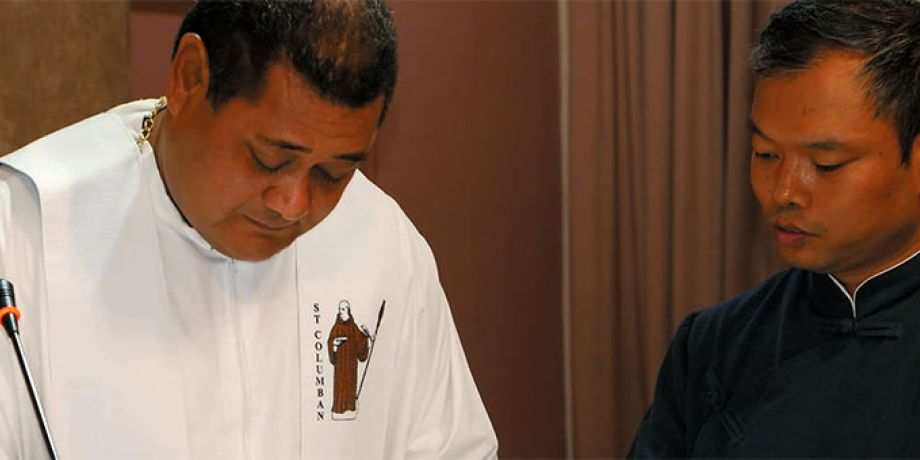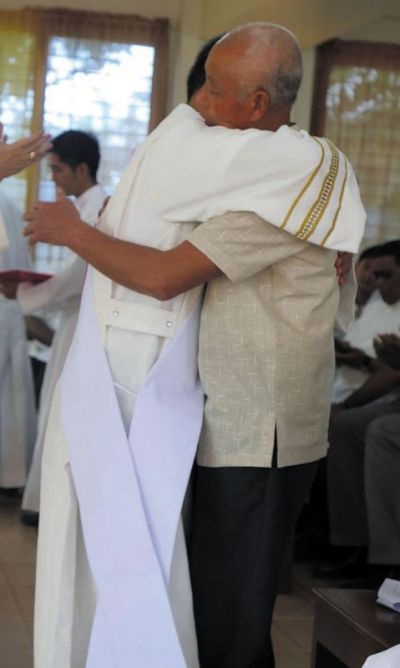
A Vocation in China
A faith born in the shadows cast by a single candle in a tightly curtained room of a small farming village in a China emerging from the repression of the Cultural Revolution in the early 1980s blossomed on February 4, 2018, in the chapel of the Columban seminary in Manila, Philippines, as Peter Dong knelt before Bishop Honesto Ongtioco to be ordained a deacon, becoming a minister of the word of God that he had imbibed in the clandestine darkness of his home so many years before. The ordination was also the fulfillment of a dream born in the imagination of an Irish priest working in China over 100 years ago.

As the bishop laid hands on the first Chinese member of the Missionary Society of St. Columban, the dream expressed by Society cofounder Bishop Edward Galvin in the 1920s, only to be shelved in the face of mounting instability and the pressure of founding a new mission, took a first, but tentative step.
Born on January 27, 1982, Peter and his older brother, along with their parents lived their Catholic faith behind the curtains. "We could only attend Mass perhaps at Easter and Christmas, as the church was a long way away and we could not arouse suspicion about our religion among our neighbors by making the trip too often," he explained.
Life was hard on the family's small farm that produced only a subsistence living. "But I do not remember being hungry," Peter said. However, he was about 15 years old before there was at least some charcoal to drive the freezing bite from the winter air in their simple rural home.
As the second son of a farmer, Peter, along with his brother learned about life on the land from his father, but in the darkened room the fl icker of the candle awoke in him a fl icker of faith and with it was born an awareness of the color it could bring into his life.
"I remember the bright vestments at Mass," he reminisced, "the green, the red and the gold embroidery," while explaining that in a society dominated by the drab of Communist grey and green, he secretly hoped that the day would come when his own life could be decorated with a similar splash of rainbow.
But the fancies of a child are not the matured faith of an adult and, although he was aware of the strange longing developing inside of him as he made his way through middle and into high school, it was not until he finally moved to a seminary college for the completion of his basic education days that he could begin to put words on it.
However, his first days in the seminary were not the smooth road of a growing vocation and after six months the rector told him he should go home for a while, as it appeared he was not enjoying the life.
At 17 years of age, his dream was shattered, but his father encouraged him not to give up and he was later accepted into a seminary in another area. But what was to unfold was far from what he had imagined when he packed his bags to leave home for the second time.
An encounter with a foreign missionary, Columban Fr. Kevin O'Neill, visiting the seminary started him thinking in a different direction, prompting him to take learning English seriously and contemplating a life quite different from the direction in which his classmates at the seminary were heading.
Then it was off to Manila for studies. Language, philosophy, theology and many other subjects became his daily fare, culminating in a year of concentrated spirituality and then a plane ticket across the world to Chile.
"It was not just another language, but a whole new vision of life," Peter recalled. He explained that the highly sensate culture of Chile came as a huge shock to him as a young Chinese man with little sense of the importance of feelings.
"I began to feel a God of warmth, a God who laughs and is close to His people, not distant as I had experienced in China. Everyone was the same in the Church — bishop, priest and people — in the Church we were all at home," he said.
"Learning Spanish was like opening a window to equity in relationship among the people," he went on. "Through this foreign culture I could see how I could be with people, and it taught me so much about the beauty of my own Chinese culture that I had never noticed before."
He learned to laugh at his own mistakes, at the humor of what does not work the way it is intended and to hear God laughing with the people.
"As a young boy I was taught that Jesus did not laugh and that life was a serious matter, but in Chile I learned that in fact, Jesus laughed a lot," he explained.
Peter added that he began to feel a deep gratitude to his parents for his very life. "In a way they were refugees from hunger," he said, "as they moved south in search of a place with food during the great famine and then paid a big fine in order to be allowed to give birth to a second child."
This taught him another great lesson. "I also learned to cry. I cried unashamedly when my best friend died in a car accident. It was a lonely feeling, but I learned through the tears to understand how I felt."
He added, "I cried in Cubao when an old missionary told me he wanted to die in the Philippines where he was missioned. Chinese people usually want to die at home, but in my tears I refl ected that I will die somewhere and I came to realize I did not care where. It is in God's hands."
His tears were somehow a solvent for the restlessness Bishop Ongtioco referred to at his ordination ceremony, as he spoke of the restless heart of Job that only settled when he placed his life in God's hands, and St. Paul, whose desire to move on was frustrated by the people that continued to flock around him.
Peter was restless when he was asked to leave the seminary, but explained that God spoke to him through the people who encouraged him and enabled him to find another direction in his life, and the restless faith of his father was calmed as he clothed him, this time not in the shroud of secrecy, but the stole of a minister of the word of the God in whom he believes so strongly.
The gestures and mannerisms of Bishop Ongtioco suggested that life is more a melody to be danced to than prose to be walked. Once again, Peter's eyes tears moistened with tears as he struggled to find words to thank those who supported him on his journey across the expanse of God's creation.
But what for Peter was a red letter day experienced by many before him, for the Missionary Society of St. Columban was one that has taken around 100 years to dawn.
One chapter of its life in China closed with the expulsion of its last member in 1954, but Father Dan Troy recalled a decision made just five years later by the then superior general, Father Timothy Connolly, to send a young Father Ned Kelly to the United States of America to study Chinese language and culture, saying it has become the prophetic opening of a new era.
But in one sense, what was a day of fulfillment of many dreams, in another, was just a peep at the restless dawn of Bishop Galvin's dream of finding others to follow him.
After many years in Hong Kong, Columban Fr. Jim Mulroney now lives in Australia.